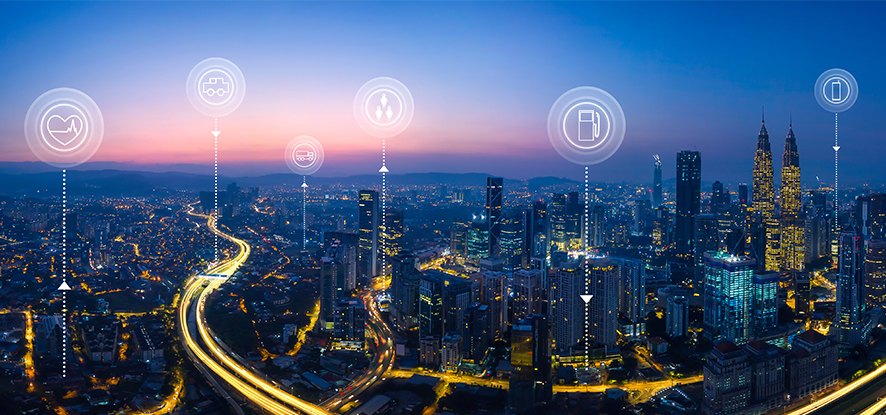By Dr. Jonathan Reichental, founder of Human Future
We frequently hear a lot about smart communities. It would be easy to believe that we’re already deep into a large and robust global movement.
The truth is somewhat different. It quickly becomes clear that the same community names surface again and again. Deservedly so, too. Cities such as Dubai, London, Helsinki, San Jose, Melbourne, and many others have impressive, holistic strategies that are making a difference in their communities.
But when viewed through the lens, say, of a planet of over 10,000 cities, a few hundred community success stories do not yet constitute a global movement.
However, the trajectory of the future suggests that in the long game, almost every community may eventually become a smart community.
Solving the Challenges Ahead
Smart communities are those that make a deliberate choice to approach the future differently. They recognize that emergent urban and rural challenges won’t be solved by old ideas and tools of the distant past.
Today, it can feel like so many community challenges are intractable. We bear some responsibility by, for example, having neglected infrastructure needs and encouraging unmanaged, economic and population growth.
But the issues are also driven by higher expectations and a world where systems and processes can’t keep up with the pace of innovation.
The diversity of issues and opportunities faced by our communities are complex and multidimensional. We’re talking about energy, climate, public safety, transportation, telecommunications, equality and equity, housing, and so much more. Our cities communities, for example, are the most complicated of human inventions.
New Ideas and Approaches
In smart communities, new technologies and data will play a significant role, but even deeper than that, these communities are those that are open to reinventing the entirety of the human experience. Their focus areas include community inclusion, collaboration, transparency, engagement, health, and more.
These communities also prioritize sustainability in the broadest sense. This means protecting the climate and the physical environment but also building natural ecosystems that thrive for everyone now and tomorrow.
When viewed this way, it becomes clear that smart communities aren’t an incremental improvement in conditions, but rather a seismic transformation of how we approach community planning, design, and management.
The Journey Begins for Some
What’s impressive already is that so many community leaders have recognized the role of innovation and are driving projects forward. These piecemeal efforts are valuable and are making a difference.
However, what’s ultimately needed, are strategies that deliver game changing community experiences that are comprehensive and interconnected.
For example, solving traffic congestion won’t be fixed by adding more lanes. In fact, research shows that adding more lanes can create more problems than they solve. Being smart means looking at deep root causes including existing motivations and behaviors. It’s also about exploring multiple alternatives that include more walkable areas, incentivizing bike usage and higher quality public transport options. It may also means planning for a future of autonomous vehicles.
There are lots of one-off traffic innovations in cities all over the world, but they won’t qualify a municipality to be a smart community.
Time for Leadership Action
As each community leader considers the daunting complexities of the future, they will soon face an essential decision.
Should they continue business as usual and solve issues in a piecemeal fashion — a whack-a-mole approach, so to speak? Sadly, so much of public policy, particularly in the urban innovation space, reflects this choice.
Alternatively, should they acknowledge the magnitude of the challenges ahead and embrace a completely new path—one that prioritizes new ideas, new technologies, and a more humanistic approach?
Some might argue that this view of the leadership choice is too simplistic. But could it be that it really does come down to those leaders who see future actions as a dysfunctional continuation of today, or to those that believe that the future requires us to confront tomorrow in entirely new ways?
We really are at a pivotal point in human history. With accelerating urbanization and innovation, it appears there is some inevitability to the choice ahead. A better, more sustainable future requires leaders who are ready to jump in and embrace the smart communities journey.
Want to learn more? Earn a professional certificate in Leading Smart Communities. Hosted by the Davenport Institute, this virtual program covers numerous topics on new technologies, digital knowledge and skills. The program is now accepting applications for the Summer 2021 session held via Zoom. This virtual offering will consist of a series of 2.5 hour modules held over the course of five Tuesday afternoons.
Dr. Jonathan Reichental is the CEO of Human Future, a global business and technology education, advisory and investment firm, and a speaker for the Davenport Institute’s Professional Certificate in Leading Smart Communities program. He is the former Chief Information Officer (CIO) for the City of Palo Alto and a multiple award-winning technology leader whose 30-year career has spanned both the private and public sectors. In 2017, he was named one of the top 100 CIOs in the world and in 2016 he was named a top influential CIO in the United States. Reichental is also recognized as a global thought leader on a number of emerging trends including urban innovation and blockchain technology.





